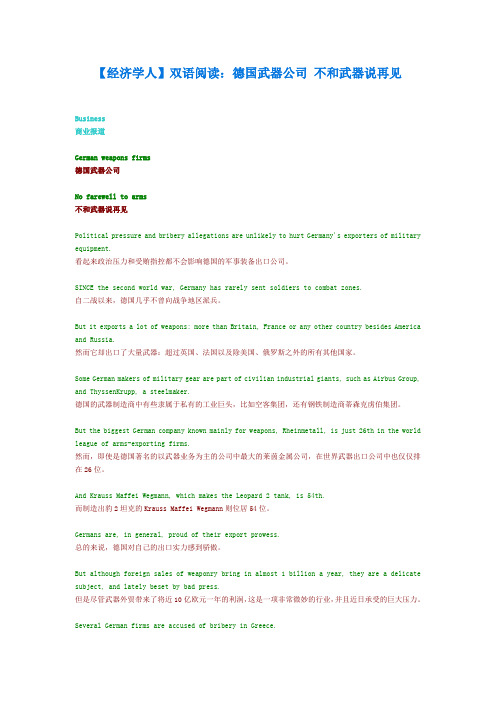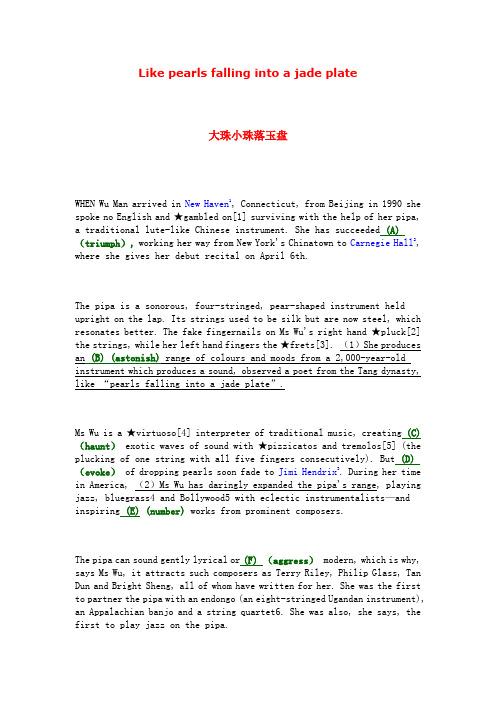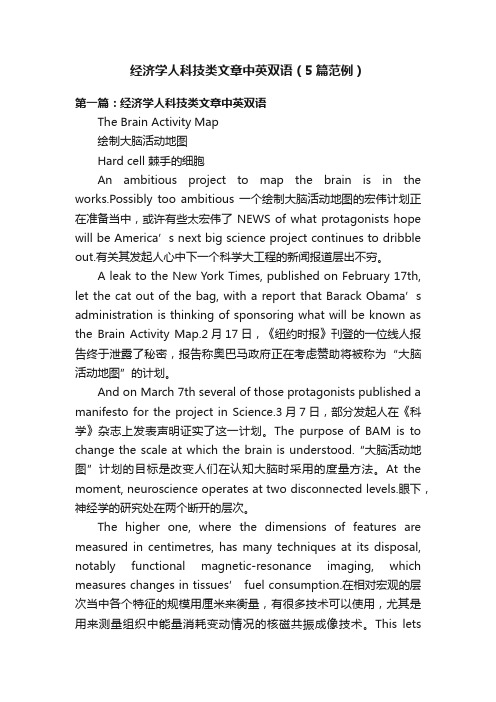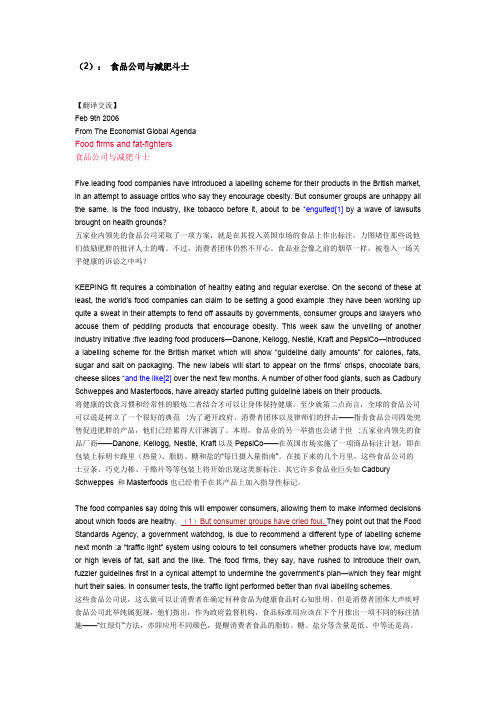经济学人双语阅读2
《经济学人》英语热点文章精选8篇(中英文对照

(考研英语阅读原文很多来自《经济学人》,希望大家好好看看)印度的救赎IN MAY America’s Federal Reserve hinted that it would soon start to reduce its vast purchases of Treasury bonds. As global investors adjusted to a world without ultra—cheap money, there has been a great sucking of funds from emerging markets。
Currencies and shares have tumbled, from Brazil to Indonesia, but one country has been particularly badly hit。
今年五月,美国联邦储备委员会(Federal Reserve)暗示,它将很快开始缩减大量购买国债的规模。
随着全球投资者开始调整策略,以适应没有超廉价资金的世界,大量资金开始逃离新兴市场.从巴西到印度尼西亚,货币及股票纷纷暴跌,但有一个国家受创尤其严重.Not so long ago India was celebrated as an economic miracle. In 2008 Manmohan Singh,the prime minister,said growth of 8—9% was India’s new cruising speed. He even predicted the end of the “chronic poverty,ignorance and disease, which has been the fate of millions of our countrymen for centuries”. Today he admits the outlook is difficult. The rupee has tumbled by 13% in three months。
经济学人双语阅读:德国武器公司 不和武器说再见

【经济学人】双语阅读:德国武器公司不和武器说再见Business商业报道German weapons firms德国武器公司No farewell to arms不和武器说再见Political pressure and bribery allegations are unlikely to hurt Germany's exporters of military equipment.看起来政治压力和受贿指控都不会影响德国的军事装备出口公司。
SINCE the second world war, Germany has rarely sent soldiers to combat zones.自二战以来,德国几乎不曾向战争地区派兵。
But it exports a lot of weapons: more than Britain, France or any other country besides America and Russia.然而它却出口了大量武器:超过英国、法国以及除美国、俄罗斯之外的所有其他国家。
Some German makers of military gear are part of civilian industrial giants, such as Airbus Group, and ThyssenKrupp, a steelmaker.德国的武器制造商中有些隶属于私有的工业巨头,比如空客集团,还有钢铁制造商蒂森克虏伯集团。
But the biggest German company known mainly for weapons, Rheinmetall, is just 26th in the world league of arms-exporting firms.然而,即使是德国著名的以武器业务为主的公司中最大的莱茵金属公司,在世界武器出口公司中也仅仅排在26位。
16英语阅读-经济学人《Economics》双语版-Like pearls falling into a jade plate

Like pearls falling into a jade plate大珠小珠落玉盘WHEN Wu Man arrived in New Haven1, Connecticut, from Beijing in 1990 she spoke no English and ★gambled on[1] surviving with the help of her pipa, a traditional lute-like Chinese instrument. She has succeeded (A) (triumph),working her way from New York's Chinatown to Carnegie Hall2, where she gives her debut recital on April 6th.The pipa is a sonorous, four-stringed, pear-shaped instrument held upright on the lap. Its strings used to be silk but are now steel, which resonates better. The fake fingernails on Ms Wu's right hand ★pluck[2] the strings, while her left hand fingers the ★frets[3]. (1)She produces an (B) (astonish) range of colours and moods from a 2,000-year-old instrument which produces a sound, observed a poet from the Tang dynasty, like “pearls falling into a jade plate”.Ms Wu is a ★virtuoso[4] interpreter of traditional music, creating (C) (haunt)exotic waves of sound with ★pi zzicatos and tremolos[5] (the plucking of one string with all five fingers consecutively). But (D) (evoke) of dropping pearls soon fade to Jimi Hendrix3. During her time in America, (2)Ms Wu has daringly expanded the pipa's range, playing jazz, bluegrass4 and Bollywood5 with eclectic instrumentalists—and inspiring (E) (number) works from prominent composers.The pipa can sound gently lyrical or(F) (aggress) modern, which is why, says Ms Wu, it attracts such composers as Terry Riley, Philip Glass, Tan Dun and Bright Sheng, all of whom have written for her. She was the first to partner the pipa with an endongo (an eight-stringed Ugandan instrument), an Appalachian banjo and a string quartet6. She was also, she says, the first to play jazz on the pipa.All this happened after she arrived in America. Young Chinese musicians are now ubiquitous in American and European conservatories, competitions and concert halls, but during China's cultural revolution the performance of Western music was greatly restricted. Traditional instruments, however, were(G) (courage),and Ms Wu, born in 1964 in Hangzhou, began studying the pipa when she was nine.She entered the Beijing Central Conservatory of Music (where she heard Western music for the first time) and became the first (H) (receive)of a masters degree in the pipa. She was awarded a ★tenured[6] faculty position. But her curiosity about the West proved (I) (resist). Colleagues who had emigrated to the United States warned her that there was no interest in Chinese traditional music, (3)but, undaunted, she packed seven instruments (including pipas, a zither and a dulcimer) and set off.During the first two difficult years she learnt English and cried a lot. She joined other Chinese musicians and began performing in New York's Chinatown,(J) (rehearse) in the basement of a dry-cleaner. (4)American musicians would approach her after concerts,(K) (fascination).David Harrington of the Kronos Quartet said that the first time he heard her play was like the first time he heard Jascha Heifetz, a master violinist.Mr Harrington chose her to perform in the quartet's recent Bollywood-(L) (inspiration) recording because he wanted one person to create many different sounds. (5)Ms Wu, with her “large sonic vocabulary”, was uniquely qualified. She also attracted the attention of Yo Yo Ma, a cellist with whom she now frequently performs as a member of his Silk Road★Ensemble[7].Pipa players and audiences in China are also becoming more open minded; she caused(M) (exciting) when she performed in Beijing with the Kronos Quartet ten years ago. “That's my hope,” she says, “that (6)the next generation know there is another way for traditional instruments to survive.”[QUIZ]1. 用文中空白后括号内单词的适当(相关)形式填空(可以是动词、形容词及副词,注意时态、语态、比较级乃至派生词等),每空只填一词:如:WHEN Wu Man ________(arrival) in New Haven, Connecticut, from Beijing in 1990 she spoke no English.此空白处应填arrived.(欢迎就出题方式提出您的宝贵意见)2. 将文中划线部分翻译成英语:[NOTES](LONGMAN)[1]gamble v.以……为赌注,孤注一掷to do something that involves a lot of risk, and that will not succeed unless things happen the way you would like them togamble onThey're gambling on Johnson being fit for Saturday's game.gamble something on somethingPotter gambled everything on his new play being a hit.[2]pluck v.弹拨to pull the strings of a musical instrumentpluck atSomeone was plucking at the strings of an old guitar.[3]fret n.音品;安在某些弦乐器如吉他弹拨处的一个或多个隆起物one of the raised lines on the fretboard of a guitar etc[4] virtuoso plural virtuososn. 技术超群的表演者(尤指音乐)someone who is a very skilful performer, especially in music:violin virtuoso Stephane Grappelli—virtuoso adjective [only before noun]a virtuoso performancea virtuoso pianist[5] pizzicatos and tremolos拨奏曲和颤音[6]tenure[UC]享有终身教授的权利 the right to stay permanently in a teaching job: It's becoming increasingly difficult to acquire academic tenure. —tenured adjective:a tenured professora tenured position[7]ensemble <法>全体, [音]合唱曲, 全体演出者[TIPS & BACKGROUND]1. 纽黑文(New Haven):美国康涅狄格州(Connecticut)南部城市,临长岛海湾,对外贸易港口。
经济学人科技类文章中英双语(5篇范例)

经济学人科技类文章中英双语(5篇范例)第一篇:经济学人科技类文章中英双语The Brain Activity Map绘制大脑活动地图Hard cell 棘手的细胞An ambitious project to map the brain is in the works.Possibly too ambitious 一个绘制大脑活动地图的宏伟计划正在准备当中,或许有些太宏伟了 NEWS of what protagonists hope will be America’s next big science project continues to dribble out.有关其发起人心中下一个科学大工程的新闻报道层出不穷。
A leak to the New York Times, published on February 17th, let the cat out of the bag, with a report that Barack Obama’s administration is thinking of sponsoring what will be known as the Brain Activity Map.2月17日,《纽约时报》刊登的一位线人报告终于泄露了秘密,报告称奥巴马政府正在考虑赞助将被称为“大脑活动地图”的计划。
And on March 7th several of those protagonists published a manifesto for the project in Science.3月7日,部分发起人在《科学》杂志上发表声明证实了这一计划。
The purpose of BAM is to change the scale at which the brain is understood.“大脑活动地图”计划的目标是改变人们在认知大脑时采用的度量方法。
考研英语阅读理解外刊原文经济学人_2

Surging living costs force Britons to work past retirement age生活成本飙升迫使英国人退休后继续工作The share of older UK workers planning to carry on working in their retirement has nearly doubled in two years due to rising living costs and insufficient pension savings, according to a survey from Abrdn.根据Abrdn的一项调查, 由于生活成本上升和养老金储蓄不足, 计划退休后继续工作的英国老年员工比例在两年内增加了近一倍。
The investment manager’s stark findings underscore the impact of soaring energy and food prices on household budgets, which is pressuring people’s finances as inflation hits a 30-year high.这家投资管理公司的严峻调查结果凸显出能源和食品价格飙升对家庭预算的影响。
随着通胀触及30年高点, 家庭预算正给人们的财务状况带来压力。
Surveying people planning to retire in 2022, Abrdn found that 66 per cent respondents proposed to continue with some form of employment beyond retiring, up from just over 50 per cent in a similar study last year and just 34 per cent in 2020.Abrdn对计划2022年退休的人进行了调查, 发现66%的受访者打算在退休后继续从事某种形式的工作, 而在去年的一项类似研究中, 这一比例略高于50%, 而在2020年, 这一比例仅为34%。
3英语阅读-经济学人《Economics》双语版-Foodfirmsandfat-fighters

(2):食品公司与减肥斗士【翻译交流】Feb 9th 2006From The Economist Global AgendaFood firms and fat-fighters食品公司与减肥斗士Five leading food companies have introduced a labelling scheme for their products in the British market, in an attempt to assuage critics who say they encourage obesity. But consumer groups are unhappy all the same. Is the food industry, like tobacco before it, about to be *engulfed[1]by a wave of lawsuits brought on health grounds?五家业内领先的食品公司采取了一项方案,就是在其投入英国市场的食品上作出标注,力图堵住那些说他们鼓励肥胖的批评人士的嘴。
不过,消费者团体仍然不开心。
食品业会像之前的烟草一样,被卷入一场关乎健康的诉讼之中吗?KEEPING fit requires a combination of healthy eating and regular exercise. On the second of these at least, the world’s food companies can claim to be setting a good example :they have been working up quite a sweat in their attempts to fend off assaults by governments, consumer groups and lawyers who accuse them of peddling products that encourage obesity. This week saw the unveiling of another industry initiative :five leading food producers—Danone, Kellogg, Nestlé, Kraft and PepsiCo—introduced a labelling scheme for the British market which will show “guideline daily amounts” for calories, fats, sugar and salt on packaging. The new labels will start to appear on the firms’ crisps, chocolate bars, cheese slices *and the like[2] over the next few months. A number of other food giants, such as Cadbury Schweppes and Masterfoods, have already started putting guideline labels on their products.将健康的饮食习惯和经常性的锻炼二者结合才可以让身体保持健康。
economist(经济学人)精品文章中英对照(合集五篇)
economist(经济学人)精品文章中英对照(合集五篇)第一篇:economist(经济学人)精品文章中英对照Whopper to go 至尊汉堡,打包带走Will Burger King be gobbled up by private equity? 汉堡王是否会被私人股本吞并?Sep 2nd 2010 | NEW YORKSHARES in Burger King(BK)soared on September 1st on reports that the fast-food company was talking to several private-equity firms interested in buying it.How much beef was behind these stories was unclear.But lately the company famous for the slogan “Have It Your Way” has certainly not been having it its own way.There may be arguments about whether BK or McDonald’s serves the best fries, but there is no doubt which is more popular with stockmarket investors: the maker of the Big Mac has supersized its lead in the past two years.有报道披露,快餐企业汉堡王(BK)正在与数个有收购意向的私人股本接洽,9月1日,汉堡王的股值随之飙升。
这些报道究竟有多少真材实料不得而知。
汉堡王的著名口号是“我选我味”,但如今显然它身不由己,心中五味杂陈。
汉堡王和麦当劳哪家薯条最好吃,食客们一直争论不休,但股票投资人更喜欢哪家股票,却一目了然:过去两年里,巨无霸麦当劳一直在扩大自己的优势。
经济学人译文精选2
经济学人官方译文2Clearing-housesDouble-crossed清算所豪赌翻番Bigger may not be better when it comes to clearing-houses对清算所来说,大未必好THE bookmaker on Aldgate High Street, on the fringes of London’s financial district, attracts its fair share of risk-takers. But across the road, at the offices of LCH.Clearnet, part of the London Stock Exchange Group (LSE), the really big bets are handled. It and other clearing-houses now occupy a central position in high finance. They ensure that trillions of dollars are paid out on derivatives contracts each day. A decade of dealmaking has created five big beasts of clearing: LSE, Deutsche Börse, CME Group, ICE and HKEX.A planned merger between LSE and the Germans would reduce that to four.位于伦敦金融区边缘的阿尔德门大街(Aldgate High Street)上的博彩公司吸引了自己的一批冒险者。
但马路对面,属于伦敦证券交易所集团(LSE)的伦敦清算所集团(LCH.Clearnet)才是真正玩大赌注的地方。
经济学人(英语文章带翻译)
Nice work if you can get out 谁都不愿摊上这种好事Free exchange自由交流Why the rich now have less leisure than the poor为什么当今富人的休闲时间比穷人还少Apr 19th 2014 | From the print edition1 FOR most of human history rich people had the most leisure. In “Downton Abbey”, a drama a bout the British upper classes of the early 20th century, one aloof aristocrat has never heard of the term “weekend”: for her, every day is filled with leisure. On the flip side, the poor have typically slogged. Hans-Joachim Voth, an economichistorian at the University of Zurich, shows that in 1800 the average English worker laboured for 64 hours a week. “In the 19th century you could tell how poor somebody was by how long they worked,” says Mr Voth.”2 In today's advanced economies things are different. O verall working hours have fallen over the past century. But the rich have begun to work longer hours than the poor. In 1965 men with a college degree, who tend to be richer, had a bit more leisure time than men who had only completed high school. But by 2005 the college-educated had eight hours less of it a week than the high-school grads. Figures from the American Time Use Survey, released last year, show that Americans with abachelor's degree or above work two hours more each day than those without a high-school diploma. Other research shows that the share of college-educated American men regularly working more than 50 hours a week rose from 24% in 1979 to 28% in 2006, but fell for high-school dropouts. The rich, it seems, are no longer the class of leisure.3 There are a number of explanations. One has to do with what economists call the “substitution effect”. Higher wages make leisure moreexpensive: if people take time off they give up more money. Since the 1980s the salaries of those at the top have risen strongly, while those below the median have stagnated or fallen. Thus rising inequality encourages the rich to work more and the poor to work less.,4 The “winner-takes-all” nature of modern economies may amplify the substitution effect. The scale of the global market means businessesthat innovate tend to reap huge gains (think of YouTube, Apple and Goldman Sachs). The returns for beating your competitors can be enormous. Research from Peter Kuhn of the University of California, Santa Barbara, and Fernando Lozano of Pomona College shows that the same is true for highly skilled workers. Although they do not immediately get overtimepay for “extra” hours, the most successful workers, often the ones putting in the most hours, may reap gains from winner-takes-all markets. Whereas in the early 1980s a man working 55 hours a week earned 11% more than a man putting in 40 hours in the same type of occupation, that gap had increased to 25% by the turn of the 5 Economists tend to assume that the substitution effec t must at some stage be countered by an “income effect”: as higher wages allow people to satisfy more of their material needs, they forgo extra work and instead choose more leisure. Abillionaire who can afford his own island has little incentive to work that extra hour. But new social mores may have flipped the income effect on its head.6 The status of work and leisure in the rich world has changed since the days of “Downton Abbey”. Back in 1899 Thorstein Veblen, an American economist who dabbled in sociology, offered his take on things. He argued that leisure was a “badge of honour”. Rich people could get others to do the dirty, repetitive work—what Veblen called “industry”. Yet Veblen's leisure class was not idle. Rather they engaged in“exploit”: challe nging and creative activities such as writing, philanthropy and debating.7 Veblen's theory needs updating, according to a recent paper from researchers at Oxford University*. Work in advanced economies has become more knowledge-intensive and intellectual. There are fewer really dull jobs, like lift-operating, and more glamorous ones, like fashion design. That means more people than ever can enjoy “exploit” at the office. Work has come to offer the sort of pleasures that rich people used to seek in their time off. On the flip side, leisure is no longer a sign of social power. Instead it symbolises uselessness and unemployment.8 The evidence backs up the sociological theory. The occupations inwhich people are least happy are manual and service jobs requiringlittle skill. Job satisfaction tends to increase with the prestige ofthe occupation. Research by Arlie Russell Hochschild of the Universityof California, Berkeley, suggests that as work becomes moreintellectually stimulating, people start to enjoy it more than home life. “I come to work to relax,” one interviewee tells Ms Hochschild. And wealthy people often feel that lingering at home is a waste of time. A study in 2006 revealed that Americans with a household income of more than $100,000 indulged in 40% less “passive leisure” (such as watching TV) than those earning less than $20,000.Condemned to relax休闲是无奈之举9 What about less educated workers? Increasing leisure time probably reflects a deterioration in their employment prospects as low-skill and manual jobs have withered. Since the 1980s, high-school dropouts have fared badly in the labour market. In 1965 the unemployment rate of American high-school graduates was 2.9 percentage points higher than forthose with a bachelor's degree or more. Today it is 8.4 points higher. “Less educated people are not necessarily buying their way into leisure,” explains Erik Hurst of the University of Chicago. “Some of that time off work may be involuntary.” There may also be change in the income effect for those on low wages. Information technology, by opening a vast world of high-quality and cheap home entertainment, means that low-earners do not need to work as long to enjoy a reasonably satisfying leisure.从历史上来看,但凡富人都是最闲的。
经济学人双语阅读
经济学人杂志双语阅读Consumer spending in Asia:Shopaholics wantedConsumer spending in Asia亚洲消费状况Shopaholics wanted 购物狂时代该来了?Jun 25th 2009 | HONG KONGFrom The Economist print editionCan Asians replace Americans as a driver of global growth?亚洲人能够代替美国人做全球经济的发动机吗?ASIA'S emerging economies are bouncing back much more strongly than any others. While America's industrial production continued to slide in May, output in emerging Asia has regained its pre-crisis level (see chart 1). This is largely due to China; but although production in the region's smaller economies is still well down on a year ago, it is rebounding in those countries too. Taiwan's industrial output rose by an annualised 80% in the three months to May compared with the previous three months. JPMorgan estimates that emerging Asia's GDP has grown by an annualised 7% in the second quarter.时下亚洲新兴经济体们的恢复势头比其他任何国家都要迅猛。
- 1、下载文档前请自行甄别文档内容的完整性,平台不提供额外的编辑、内容补充、找答案等附加服务。
- 2、"仅部分预览"的文档,不可在线预览部分如存在完整性等问题,可反馈申请退款(可完整预览的文档不适用该条件!)。
- 3、如文档侵犯您的权益,请联系客服反馈,我们会尽快为您处理(人工客服工作时间:9:00-18:30)。
经济学人杂志双语阅读:Muffled signals模糊的信号
Sovereign credit-default swaps
主权信用违约掉期
Muffled signals
模糊的信号
Jun 11th 2009 | WASHINGTON, DC
From The Economist print edition
Credit derivatives on countries are behaving oddly
主权信用衍生品市场表现奇异
GOVERNMENTS in the rich world are announcing record-breaking deficits and their credit ratings are under threat. Yet the market that should be most worried is not. An index of credit-default-swap (CDS) spreads on the seven biggest rich economies maintained by Credit Derivatives Research (CDR), a research outfit, has widened in recent weeks, but still signals half the risk it did in February, before the full scale of the damage to public finances became clear (see chart). The trend holds true even for Britain, which is threatened with a credit-rating downgrade, and Ireland, which on June 8th suffered its second sovereign downgrade in three months.
发达国家的政府们正在不断宣布着打破纪录的赤字额,他们的信用评级也正面临着危险。
然而理应最为人们所担心的(信用违约)市场却没有显示出相应风险。
(尽管)一项由信用衍生品研究机构(CDR)提供的、基于七个最大最富有经济体的信用违约掉期利差在最近几周内有所扩大,但是在公共财政面临的全方位威胁一览无余之际,信用违约掉期利差仍然仅显示出相当于其今年二月时所显示的一半的风险。
(如图。
即“仅从信用违约掉期利差的走势图中,并未显示出与利差走势相适应的公共财政风险”)这一趋势即使对英国和爱尔兰也是如此,英国正面领着信用评级遭降级的威胁,而爱尔兰在6月8日那天遭到其三个月中第二次主权信用降级。
Dave Klein at CDR admits to being puzzled by the trend. He reckons that investors associate sovereign-default risk with overall financial risk because governments now backstop so much of the system. When America bailed out Fannie Mae and Freddie Mac, the country's two big mortgage agencies, its CDS spreads widened sharply. Conversely, a recovering economy means fewer bank failures, so government balance-sheets are less likely to be strained by bail-outs.
信用衍生品研究机构(CDR)的Dave Klein承认他对这一趋势感到困惑。
他认为由于政府如今对于金融系统做了如此多的增援支持,投资者会将主权违约风险和总体金融风险联系起来。
当美国对国内最大的两家房屋抵押贷款机构房利美和房地美实行救市计划时,其信用违约掉期的利差迅速扩大。
反之,经济复苏意味着更少的银行倒闭事件,因此政府的资产负债表被救市计划拖累的可能性也就越小。
Sovereign CDSs are in any case harder to interpret than corporate CDSs. Rich-country defaults are extremely rare (emerging markets, less so) which makes it difficult for investors to estimate how much they would recover in bankruptcy, a key determinant in CDS pricing. Moreover, payouts on the swaps are triggered in different ways. A corporation generally has a grace period on its debt payments before a credit event is declared and protection is paid off. Governments have no such grace period. If America is 30 seconds late, a credit event is declared, says Mr Klein. Sovereign CDSs also tend be priced in dollars-except for swaps on America's debt, which are priced in euros-so currency risk blurs things too.
主权信用违约掉期在任何情况下都比公司信用违约掉期更加难以解读。
发达国家的违约事件极其罕见,而新兴市场则相反。
这就让投资者难以估计信用违约掉期定价中的一项关键因素,
即他们能从(发达国家中的)破产事件中回收多少钱。
此外两种掉期的偿付有着不同的触发方式。
对于公司的信用违约掉期而言,在申明该公司发生了违约事件并赔付补偿金之前,对其债务偿付都有一段宽限期。
而对于政府债务而言则没有这段宽限期。
(所以) Klein说,“即使美国晚了30秒钟还债,仍会申明其违约。
”主权信用违约掉期通常用美元计价(美国债务的信用掉期除外,为欧元计价)。
所以,外汇风险的加入会把情况搞得更加复杂。
Sovereign CDS volumes have held up better than other parts of the market. According to figures from the Depository Trust & Clearing Corporation (DTCC. the number of contracts and the notional value of derivatives on some 60 sovereign borrowers have generally held steady or grown a bit faster than the overall CDS market.
主权信用违约掉期交易量的维持要好于市场中的其他产品,根据美国证券托管清算公司(Depository Trust & Clearing Corporation)提供的数字,基于大约60个主权国家借款的衍生品的合约数和名义价值基本上与信用违约掉期整体市场维持相对稳定,或增速略高于整体市场。
But most of this activity remains concentrated on emerging markets like Turkey, Brazil, Russia and Mexico. For rich countries, the amounts at stake are minuscule. DTCC puts the notional value of CDS contracts on American debt at $9 billion, barely 0.1% of the total amount of publicly held debt. The value of sovereign CDSs is just 6% of all CDSs, according to the Bank for International Settlements. Clues to the rickety state of public finances are better found elsewhere.
但是大部分这样的交易活动集中在诸如土耳其、巴西、俄罗斯、墨西哥等新兴市场。
对于富国而言,在外交易的主权信用违约掉期数额则小的不值一提。
据美国证券托管清算公司(DTCC.估算,美国债务签订的信用违约掉期合同的名义价值为90亿美元,仅仅只占公开交易债务总额的0.1%。
而根据国际结算银行的统计,主权信用违约掉期的价值只占所有信用违约掉期的6%。
所以,最好还是从别处找找关于公共财政已经摇摇欲坠的线索~~。
